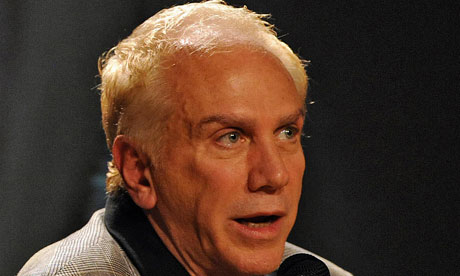
In the last three decades Venezuela has won more beauty titles than any other country: six Miss Universes, five Miss Worlds and six Miss Internationals.
It is no exaggeration to say that entering beauty competitions has become a national pastime – almost an obsession – in a country that buys more cosmetic products than any other.
Fans and foes alike put this down to the drive of one man – Osmel Sousa, the Cuban-born impresario and head of the Miss Venezuela organisation who, over 30 years, has remade the beauty industry.
"Someone dubbed me the tsar of beauty, but I find the label a bit camp," said Sousa as he instructed a designer on a dress that this year's Miss Venezuela was likely to wear at the Miss Universe gala in Sao Paulo on Monday night.
"She has beautiful dark skin so keep the translucence and watch the neckline to highlight her collarbone," he said as they retreated to his office, amid glistening crowns and faux diamond earrings.
"I started drawing when I was a child. I would draw rows of women – always women – and then pick out the best and draw them again with all sorts of dresses that I would clip on and off. My mom saw me one day and forbade me from doing it ever again. She just didn't get it! She thought I was playing with dolls, but I was designing a fashion show."
Sousa left Cuba for Venezuela after Fidel Castro took power in 1959 and began to slowly build his career.
When he was in his early 20s he landed a job as a draughtsman for the publicity firm that owned the Miss Venezuela contest.
"I would secretly choose one of the girls and coach her in my spare time and the ones I chose always won."
It did not take long for Sousa's talent to get recognised by Gustavo Cisneros, the media mogul who by then had bought Miss Venezuela, putting him in charge.
"Gustavo had total trust in me. I've not received one single instruction since I took this job 30 years ago," he said.
Many Venezuelans are proud of their country's pageant victories, but some see the growing obsession with beauty and plastic surgery as destructive.
"Venezuelan women are vain, but also intelligent, spirited and strong – no one can beat us in a discussion," wrote Khabira, author of the blog Surviving in the Land of the Misses. "We all have our charms and yet we insist on visiting an operating table to enhance our lips or reduce our waist. I can't think of anyone who hasn't gotten 'a little fixing'."
Titina Penzini, author of fashion manual 100% Chic, said: "It is no secret that beauty is a value we will take to its maximum expression.
"You walk down any street of Caracas at 6am and women will be perfectly coiffured, manicured, pedicured and impeccably made up. People here, from all walks of life, will get into debt for a pair of stilettos or a boob job. Whatever it takes,"
The demand for surgery is such that banks offer attractive loans for procedures, with slogans such as: "Have your plastic on our plastic."
Clients will often fly in from around the world to be treated in Venezuela. "I see five or six clients from abroad each month," said Roger Galindo, a plastic surgeon. "Venezuela is a pioneer in this field and we have excellent professionals, and we also have a generation-old concern with aesthetics that is not the product of surgery but of the amazing cultural intermixing this country saw."
Jane Jaquette, a Los Angeles-based professor of Latin American studies, said sudden oil wealth last century made Venezuelans admire excess and foreign imports – be it beauty contests or baseball.
Juan Carlos Bertorelli, a communications expert, said it has also made Venezuelans believe in miracles.
"As Venezuelans, we cannot have one or two static and dusty creation myths," he said.
"Our myths are daily and are audiovisual and are recreated on TV every night at prime time. Nightly soap operas show the poor maid becoming the wife of the rich impresario …
"With beauty contests, the miracle is even more radical because the transformation is physical: the girl who arrived with a natural attractiveness leaves with Botox-filled lips, breasts recently removed from their packaging, a chiselled waist and six well-rehearsed phrases from self-help manuals or Unicef brochures."
But to others, Miss Venezuela is a source of pride – even national identity – and Sousa is a hero.
"He's the country's most successful pop artist," said Boris Munoz, a researcher at Harvard's Rockefeller Centre for Latin American studies.
"He has taken such an idiosyncratic symbol of beauty as the 'queen' to a higher level, always with a subtle irony and distance that is reminiscent of Warhol."

